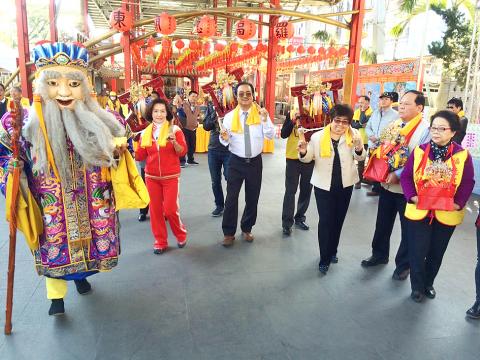More than 2,000 people in Yilan County’s Luodong Township (羅東) took part in a walk around the township organized by the township office, with many taking statues of Tudigong (土地公, the God of Land) with them.
While it is not unusual to see people parading statues of immortals on religious holidays or township offices organizing trips for residents, it is unusual to see a combination of the two.
However, in Luodong on Saturday, people joined a walking tour around the township, with many carrying statues of Tudigong taken from their homes or workplaces.

Photo: Chu Tse-wei, Taipei Times
“Tudigong is the guardian of the people and has a close relationship with the people, which can be seen everywhere,” Luodong Township Mayor Lin Tzu-miao (林姿妙) said. “We are holding the event because Tudigong’s birthday on the second day of the second lunar month [which falls on Thursday] is approaching.”
Some people carried Tudigong statues with red bags hanging over their chests, while others used small wooden sedans.
“I threw the divine blocks to ask if Tudigong would like to go for a stroll and he agreed immediately,” a woman, surnamed Chiu (邱), said.
The “divine blocks” refers to a pair of crescent-shaped wooden objects — often colored red — that people use to ask for opinions from immortals. After throwing the blocks onto the ground, if one block settles with the flat side up and the other with the rounded side up it indicates that the immortal has answered: “yes” to the question asked.
Participants came from beyond Luodong for the event, with many coming from Suao Township (蘇澳).
“As soon as we saw information about the event, we thought about bringing our Tudigong statues,” a participant from Suao said. “I asked Tudigong: ‘Uncle, would you like to go out for a walk?’ and I was surprised that he agreed immediately.”
The terms “Uncle” or “Uncle Tudigong” are both terms that people use to address the god, showing an intimacy between the God of Land and his believers.
Statues of Tudigong are often displayed at temples, while, in addition to ancestral tablets, such statues are often seen on private altars.
Worshiping Tudigong is common in companies or factories, as people believe that Tudigong might help bring success and prosperity.
The township office also arranged for a dancing lion, drummers and life-sized statue of Nezha (哪吒, also known as the Third Prince) to join the 5km walk.

The manufacture of the remaining 28 M1A2T Abrams tanks Taiwan purchased from the US has recently been completed, and they are expected to be delivered within the next one to two months, a source said yesterday. The Ministry of National Defense is arranging cargo ships to transport the tanks to Taiwan as soon as possible, said the source, who is familiar with the matter. The estimated arrival time ranges from late this month to early next month, the source said. The 28 Abrams tanks make up the third and final batch of a total of 108 tanks, valued at about NT$40.5 billion

Travel agencies in Taiwan are working to secure alternative flights for travelers bound for New Zealand for the Lunar New Year holiday, as Air New Zealand workers are set to strike next week. The airline said that it has confirmed that the planned industrial action by its international wide-body cabin crew would go ahead on Thursday and Friday next week. While the Auckland-based carrier pledged to take reasonable measures to mitigate the impact of the workers’ strike, an Air New Zealand flight arriving at Taipei from Auckland on Thursday and another flight departing from Taipei for Auckland on Saturday would have to

A group from the Taiwanese Designers in Australia association yesterday represented Taiwan at the Midsumma Pride March in Melbourne. The march, held in the St. Kilda suburb, is the city’s largest LGBTQIA+ parade and the flagship event of the annual Midsumma Festival. It attracted more than 45,000 spectators who supported the 400 groups and 10,000 marchers that participated this year, the association said. Taiwanese Designers said they organized a team to march for Taiwan this year, joining politicians, government agencies, professionals and community organizations in showing support for LGBTQIA+ people and diverse communities. As the first country in Asia to legalize same-sex

MOTIVES QUESTIONED The PLA considers Xi’s policies toward Taiwan to be driven by personal considerations rather than military assessment, the Epoch Times reports Chinese President Xi Jinping’s (習近平) latest purge of the Chinese People’s Liberation Army (PLA) leadership might have been prompted by the military’s opposition to plans of invading Taiwan, the Epoch Times said. The Chinese military opposes waging war against Taiwan by a large consensus, putting it at odds with Xi’s vision, the Falun Gong-affiliated daily said in a report on Thursday, citing anonymous sources with insight into the PLA’s inner workings. The opposition is not the opinion of a few generals, but a widely shared view among the PLA cadre, the Epoch Times cited them as saying. “Chinese forces know full well that